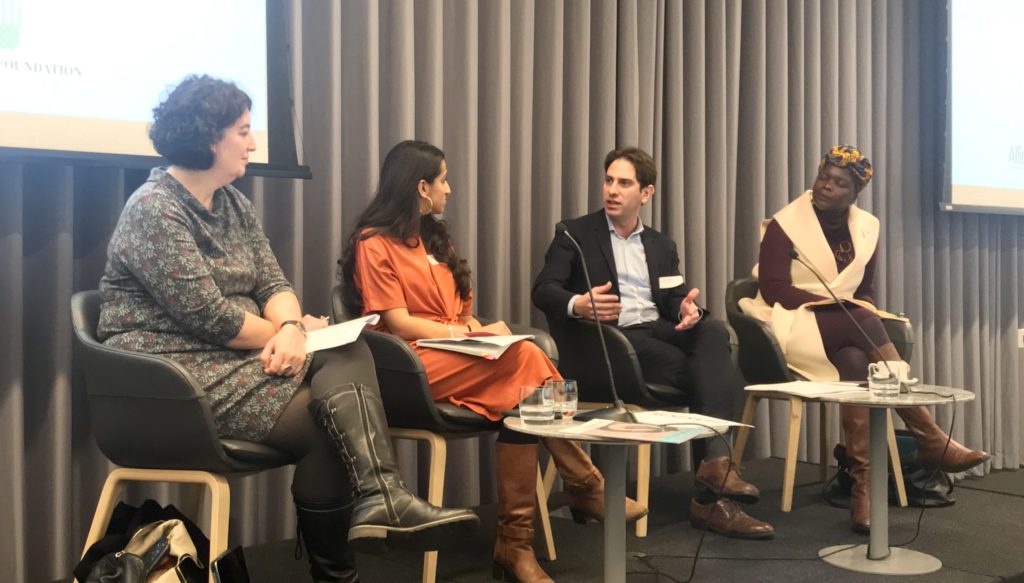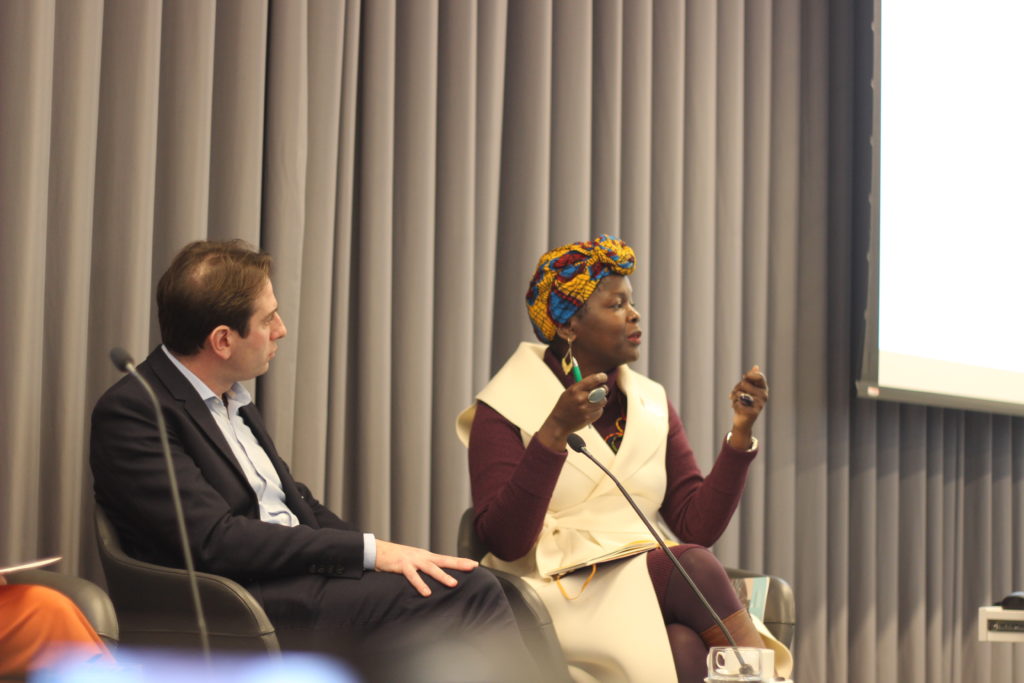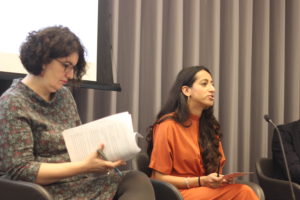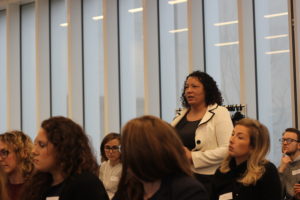Over one hundred guests arrived to hear three perspectives on feminist philanthropy from leading, thoughtful practitioners. Alliance’s Feminist Philanthropy Breakfast Club was hosted for the first time at the Aga Khan Centre, courtesy of the Aga Khan Foundation, and was sponsored by Oxford HR.

‘Funding women and girls is not enough. Philanthropy needs a feminist consciousness,’ began chair Charles Keidan, echoing the sentiments of this issue’s guest editors. ‘How you behave is as important as how you give.’ Ise Bosch (Dreilinden) and Ndana Bofu-Tawamba (Urgent Action Fund Africa) highlighted in their piece that there needs to be an intersectional funding of movements to ‘decolonise philanthropy – what seems mutual is really not, and northern philanthropy needs to get over its claims of being gender blind.’ The role of women’s funds is just one of the ways in which we can build autonomous, feminist institutions.
Dr Awino Okech, chair of the Centre for Gender Studies, SOAS, and contributor to the issue, was the first to speak, and had three points to make to open up the discussion. The first: ‘I believe the gift that the feminist movements gave the world and gave the development sector was the language of gender.’ This has been key to providing the framework for understanding gender, sexuality, power and patriarchy. ‘What black feminists, particularly in the US, added to that conversation was a discussion around interlocking oppressions,’ meaning you simply cannot think about gender as something that operates alone. We have to think about race and ‘as sets of identities and structural factors that come together into our experiences [as] people in the world.’

Dr Owino: ‘There has to be based on an understanding of a long-term approach to resolving societal problems.’
Okech’s second point was around structural transformation. Work cannot be project-based. Rather, it ‘has to be based on an understanding of a long-term approach to resolving societal problems.’ Feminist funds, says Okech, have thought very seriously about the ways in which they structure their relationships with partners, and reversing the notion that the only organisations to fund are structured ones. Okech challenged the room: those interested in funding structural transformation should also think about their own relationships with those structures. This means addressing what we think about partners and the reports we demand of them, as well as the accountability mechanisms we use.
How often do you get girls making decisions about their lives, let alone where money sits?
Okech’s final point concerned money and power. ‘I come from the school of thought that when I think about development funding, of philanthropy, I think of that as reparations.’ Rather than necessarily considering development funding as a gift, Okech instead considers this ‘a conversation about building transnational solidarity amongst funding institutions, philanthropic foundations such as yourselves, and international INGOs who are also doing this kind of work within the global south.’ Okech feels that feminist funds have ‘done an incredible job’ in getting international bilateral organisations to think about their power, and how that power translates into resourcing. An example given was within the global south women’s rights organisations, who are pushing back against governments, and letting them know that they don’t agree with their approaches to funding gender equality.
Swatee Deepak, (director, With and For Girls), was next. Deepak’s first point was how the philanthropic sector needs to readdress the notion of ‘aid’, and that white supremacy is central ‘to aid, and to power itself’. In readdressing that balance, With and For Girls is a donor collaborative of 11 different funders starting in 2014. ‘To us, what we have created speaks to our values… it’s an act of solidarity, and it’s really about the how.’
At With and For Girls, they had seen ‘girls were at the bottom of every single development indicator’ – not going to school, the highest recipients of gender-based violence, affected by child marriage, affected by climate change and indigenous rights activists. They recognised the need for additional resourcing when a World Bank report said ‘0.02 cents of every dollar in international aid was going to adolescent girls globally.’ Power balances are interrogated at all levels; the collective ‘wanted to make sure that our funding was getting to groups that were exclusively led by adolescent girls, and centred in adolescent girls’ realities and decision-making… How often do you get girls making decisions about their lives, let alone where money sits?’
Great discussion on #feministphilanthropy this morning. So much that philanthropists of all stripes can learn: focus on power & intersectionality, think about how you structure relationships & fund movements, change who makes decisions & who decides what 'impact' looks like
— Katie Boswell (@katie_boswell) December 12, 2019
With and For Girls does not focus on any particular region, as ‘there is no place in the world where girls have it better than any other set of groups.’ However, Deepak is keenly aware that this is not enough. ‘When you look at the amount of funding going to our sister women’s funds, that are going to participatory funds such as ours… that are putting money and decisions in the hands of the communities that are the ones that actually face all of these inequalities, it’s a tiny drop in the ocean and, frankly, it’s a joke.’
Movements are across the world, from Hong Kong to Sudan to the school strikes. At the front of these movements are feminists. ‘They’re the ones changing narratives, they’re the ones demanding a difference in civil society’ and, importantly, to echo Okech’s earlier point, they are decentralised – they ‘don’t conform to hierarchies, they don’t have leaders, they work and operate as ecosystems.’ It is therefore the role of funders to work out how to provide funds to informal, unregistered groups. ‘The fact that they’re unregistered and they might be an informal group of 14-year-olds in Yemen should not prevent us from getting to them… it’s our role as philanthropists to challenge those structures that exist, question them and find new and innovative ways in collaboration with communities to actually push for something better.’
We need to think about how our social justice themes – of championing voice and agency, responding to the climate emergency and strengthening civil society – really play out for women, and especially young women.’
Last to speak was Moira Sinclair, chief executive of the Paul Hamlyn Foundation (PHF), who thanked the guest-editors of the December issue for encouraging her to think over what PHF does, how they do it, how they behave and whether or not they do, in fact, look through this gender lens after all.
Ahead of the panel, Sinclair emailed everyone in the foundation about this in order to gather her thoughts. Responses came back that whilst PHF does not have a specific programmatic focus on feminism or gender equity, the organisation does say that everything it does is underpinned by social justice. With ‘that framing in place, I think it’s very difficult not to think and talk about feminism… we’re much more conscious of the barriers, structures, attitudes and behaviours that need to shift, alongside the attention to the immediate need.’ PHF has also been talking openly about wanting to see an asset based approach; has funded long term and provides core funding; funds backbone organisations who create the resources to support lobbying and advocacy work; and brings in those from backgrounds who aren’t necessarily represented in philanthropy.
Reading this issue has opened up something interesting for Sinclair in thinking of the visibility of PHF’s funding and the way they capture what they do, and why. Structurally, women are represented at all levels of the foundation. The board ratio is ⅓ women to 2/3 men, in line with wider UK charity statistics, however their senior leadership team is the other way around. PHF is led by women, with the chair, the chief executive and the chief operating officer all female.
Sinclair’s question to her team, after noting all of the above positives, was whether it ‘matters’ that PHF doesn’t do any more than that – and if they are going to do more, what does that look like? Many responses said that when PHF ‘updates our strategy, we need to think about how our social justice themes – of championing voice and agency, responding to the climate emergency and strengthening civil society – really play out for women, and especially young women.’ Others echoed the need to be more explicit about the work they do in the space, but that there was a feeling that they did not need to have a specific fund or focus.
‘we need to have moved away from ‘transporting’ people to the field… that in order to bring people closer, in order for them to understand the realities, then we have to show them ‘proof’.’
‘How do we get even better and more comfortable in funding in the messy spaces?’ Not just between programmatics, but unregistered movements and organisations. ‘It’s much harder for us to talk about our efficacy as a funder… but it’s much more real. How then do you get comfortable in that space? ‘In particular, how do we get our trustees more comfortable in that space as well? And how do we address the accountability issue whilst being comfortable in those messy spaces?’ Asking for more data places a burden on the sector, yet ‘if we don’t capture the data, we can’t code it. And if we can’t code it we can’t understand what’s going on underneath the surface.’

Swatee Deepak: “‘there is no place in the world where girls have it better than any other set of groups.”
Keidan then invited the audience to begin asking questions. Esther Thompson (ACF) asked about how best to help trustees become more comfortable with funding movements. Maya Forstater (Fair Play for Women) asked the panel on their views between sex and gender in women’s spaces, and which organisations they fund based on this. Rola El-Chami (Saïd Business School), asked about measuring impact.
Okech responded first. The concept of ‘bridging’ is a very important, but she cautioned that ‘we need to have moved away from ‘transporting’ people to the field… that in order to bring people closer, in order for them to understand the realities, then we have to show them ‘proof’.’ The conversation then often moves to impact. How do we know that funding a decentralised movement translates into value for money? Okech explained that within Africa many lessons have been drawn from Tunisia and Egypt into the conversations currently ongoing within Sudan and Algeria. Unseating one ‘strongman’ through a movement ‘does not unseat the deep state. And so the conversations are shifting – it’s no longer just about removing the strongman, it’s about ensuring a significant part of the architecture goes with them.’ Supporting this work means thinking more expansively – ‘and perhaps maybe we need to even think about who is sitting on our board of trustees?’
Okech also argued that it is as important for social justice foundations to fund experiments as it is for science-oriented foundations. Rather than demanding proof, if you want to bring in an intersectional approach to funding, it is vital to ‘put a pot of money aside, look for partners who you want to put an investment in, and let them go out and test it…. Be brave, be bold.’
Okech’s last point was around what it means to fund women and girls. ‘We can talk about the importance of funding women and girls… but not use that as a euphemism or as a way to then say we are being trans exclusionary. I think we need to be able to hold those two conversations honestly, authentically, and do so in ways that do not end up giving fodder to the Trumps and the anti-right movements that are circulating across the globe.’
‘I often sit in meetings around data… within the philanthropic sector, and usually it’s a bunch of us – people sat in the global north, mainly white, who are deciding what impact looks like in communities, and what change looks like, and then building indicators and data sets that prove our reality.’
Deepak said funders need to think about how they do their work without bringing in people from the movement space. ‘What value is there for someone from the movement to be in that dialogue, and why do we feel that we have the power to take them out of their space to actually educate us? Working in collectives with other funders allows you to gain that experience… of what it means to fund movements.’ It is imperative that the sector works out how to collaborate in order to learn from one another, rather than placing this burden on movements and communities themselves.
Still reflecting on some of the really interesting points made by the panel at this morning's @Alliancemag #feministphilanthropy breakfast event. Funding must go further than just funding women and girls projects, we need to look at ecosystems and movements.
— Jen Gordon (@jen_gordon10) December 12, 2019
Responding to sex and gender, Deepak said that we ‘need to be aware that people are facing multiple inequities in communities around the world, and those ones that are trans are even further impacted by patriarchy, by all systems of oppression.’ With and For Girls’ emphasis on self determination means ‘when we talk about girls, it’s about putting that definition about what it means to be a girl in the hands of girls themselves. I’m not an adolescent girl, I’m not one in Yemen, in Mali, or in the Solomon Islands. That reality of what it means to be a girl, to identify as a girl, should sit with who that person is in those communities.’ Deepak said through their work, the collective has seen that taking a girl-focused lens means they have ended up meeting the needs of LGBT+ youth, boys, and other groups in the community.
Around measurement, it is important to know what we are measuring, and who are measuring it for. ‘I often sit in meetings around data… within the philanthropic sector, and usually it’s a bunch of us – people sat in the global north, mainly white, who are deciding what impact looks like in communities, and what change looks like, and then building indicators and data sets that prove our reality.’ It is far more important instead to be in a dialogue, a discussion, with communities as to what change really means, both intended and unintended. ‘The value in what’s happening is defined by those communities and so we keep our reporting formats and tools to the minimum, so it provides space for that dialogue to be understood… and we can hopefully try and readdress the power balance by not defining our success, or what impact looks like’, but instead they can provide sufficiently open-ended questions in order for communities to ‘actually dialogue with us and tell us what change looks like, and what challenges look like for them.’
Sinclair spoke about the tension PHF currently holds. Ideally, there would be a way to both capture learning on an individual grant basis, so that the organisation learns, whilst recognising that as grantmakers, ‘if we want to be as equal and open as possible, we need to understand what we’re doing and to work out how to do that at scale effectively.’
Okech asked if there should be a much more systematic approach to information collection, to avoid overwhelmed grantees. There are ways to do this incrementally over time, and Okech referenced Mama Cash as an organisation which collects ‘significant and substantive data in ways that do not put too much pressure on the people they are working with.’

Maya Forstater (Fair Play for Women)
Sarah Bayjoo, (ActionAid), asked how best to encourage and engage women as philanthropists. Leah Wawro, (Independent Diplomat), asked how innovative forms of philanthropy can be used to bridge the gap between grassroots activists and the political decisions which directly affect communities. Geraldine Tovey (London Funders) then asked how movements work alongside more mainstream charities.
Sinclair replied that bridging was certainly possible – and, indeed, PHF funds both grassroots and movement-building work, as well as leadership programmes in order to give voice and agency for young people to become the leaders in the future, which ‘doesn’t just sit within a mentoring space’. This also includes modelling that behaviour and bringing ‘young women into the decision-making of our own foundation’.
On women within philanthropy, Sinclair noted that ‘the reality has been that the money has sat with men for many, many years’. It is also worth interrogating what we mean when we think ‘philanthropy’, where often it’s the deep pockets of Gates and Zuckerberg who come to mind. It is that reframing, where ‘philanthropy is not just about the billions and the corporates, and is much more about…the relational sense of what you can bring to your community or to your cause’ which needs to be further amplified.
‘When I was running charities… it felt like everyone who ran a philanthropic organisation in the UK was a man in his fifties wearing a blazer who came from the military. It was a very odd dynamic – something to do with trust and money, I think.’
Deepak encouraged the audience to speak with community foundations to learn about motivating female philanthropists. ‘They are foundations where all the decisions are run by the community, but the funding comes from that community.’ Deepak continued that it is important to create a safe space for critique and learning, ‘to challenge and push one another in absence of needing to bring people from the community in as fodder.’
In bringing grassroots activists into positions of power, Deepak also noted that movements are so multifaceted that they can also include these actors within them. These movements come together so quickly, ‘and we need to get funding to them in that moment [so] that they have the space and the leverage to be able to build those intergenerational, intersectional dialogues with other stakeholders and actors in their communities.’ This led onto Deepak’s last point, where With and For Girls innovatively get girls into powerful spaces, and referenced this video.
Keidan then asked the panel about what needs to be done within the foundation sector to increase the extent of gender equality. Sinclair replied that she increasingly hears people ‘anxious about the public platform’ surrounding philanthropy and managing the power dynamic, but she thought there to be a significant shift in the UK over the last 5 years. ‘When I was running charities… it felt like everyone who ran a philanthropic organisation in the UK was a man in his fifties wearing a blazer who came from the military. It was a very odd dynamic – something to do with trust and money, I think.’ Peers now include a number of women. Sensing that the default may be for women to ‘do really great work really quietly’, we instead need to ‘to be comfortable to be those women, and to challenge ourselves to move into that space. To be on the recruitment panels, to work with the right recruitment agencies, to sponsor other women… to pass it on.’
I can produce many stories if I wanted to, I have them, and they’re not of other people – my own stories. But I refuse for that to be the way in which people see me, or the ways in which I engage with different platforms.’
Okech agreed with these sentiments, and also encouraged the room to think about pipelines. ‘There are only 5 black women professors in the UK,’ she said. ‘What we have had to do is think about how we structure our hiring, our job applications. If you put in just a few key words, you are likely to shift the demographic of who applies for this job… it’s not enough to get people into space within which they are already feeling uncomfortable, but to ensure they get through.’
Okech also spoke of the expectations people have from different groups of people. ‘There are very many sectors and parts of our society who are more comfortable with hearing… women from different parts of the global south offer testimonies.’ In this way, Okech asks that we ‘stop inviting people and framing [it] as “come and tell us your story” – because the minute you say that, you are priming me to come and give you a case study. You are not priming me to connect that case study, and my experiences, with the structural dynamics that create that case study. And that’s all we ever want to see from particular groups of women in certain parts of the world. That’s a power question… I can produce many stories if I wanted to, I have them, and they’re not of other people – my own stories. But I refuse for that to be the way in which people see me, or the ways in which I engage with different platforms.’
Keidan asked how important it is for men to be allies in this space – ‘incredibly important,’ said Deepak. Commenting on the fact that she counted 12 men in a room seating over 100 attendees, she continued that ‘one of the things we need to embrace is that feminism is just calling out where inequity sits, it’s not saying that equity is just for one set of groups.
Feminist philanthropy is the same – it lifts up everyone in the community.’
Amy McGoldrick is the Marketing, Advertising & Events Officer at Alliance magazine.
To watch the full recording of the panel debate, click below.
This Alliance magazine Breakfast Club was sponsored by Oxford HR.






Comments (0)